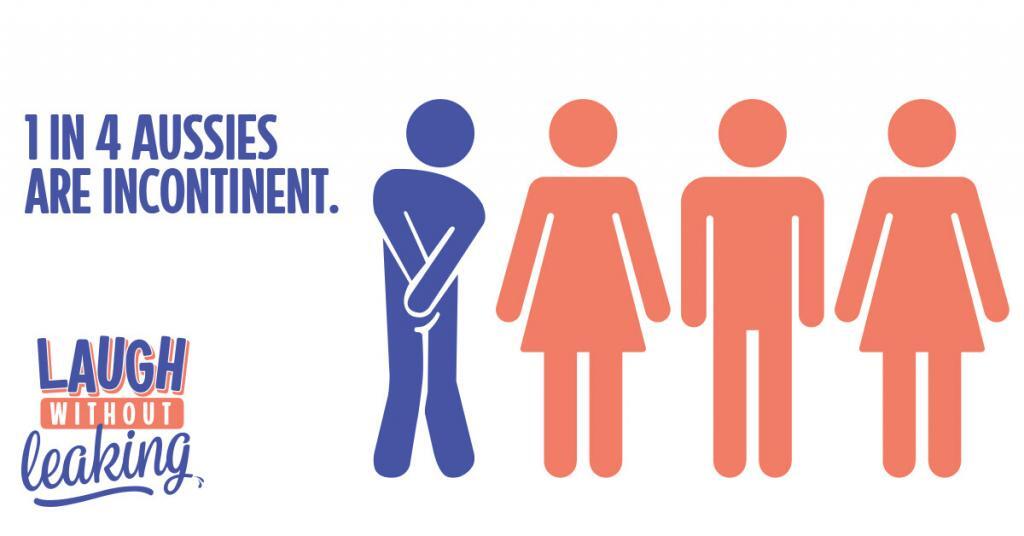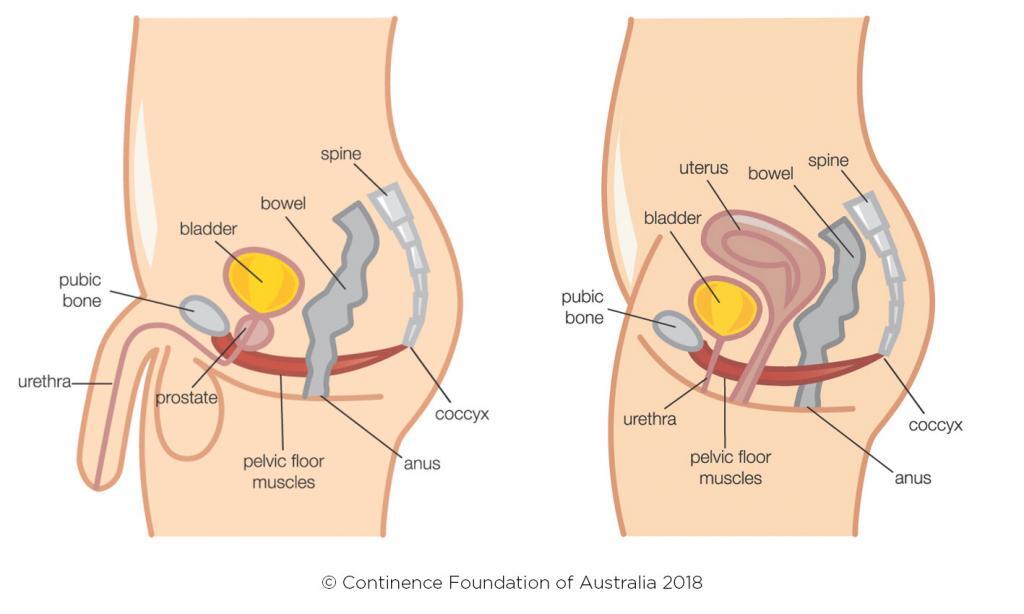
Do You Leak When You Laugh? Incontinence Blog
Ashleigh Mason | Complex Care Physiotherapist | Upwell Health Collective
Do you leak when you laugh? What about when you cough or sneeze? Or how about when you exercise? You’re not alone. 1 in 4 Australians experience symptoms of incontinence. That’s 5 million aussies! This week is World Continence Week, and we wanted to get the low down on continence, so we sent one of our Physiotherapists, Ashleigh Mason, to speak to Janine Armocida from the Continence Foundation of Australia.
Q: Hi Janine, thanks for chatting to us today! A lot of Australian’s h
ave a rough understanding of continence & incontinence. But can you tell us what continence means?
A: Continence means having control of one’s bladder and bowel habits. Some people with certain health conditions or congenital abnormalities may not be able to control their bladder or bowel function. Incontinence then is the lack of control over your bladder or bowel.
Q: What are the stats in Australia for incontinence?
A: This is scary! 1:4 Australians experience incontinence. That’s over 5 million people.
More than half the women living in the community with urinary incontinence are under 50yrs old! So it’s a huge problem and often poorly understood because in most cases it can be cured or improved.
Q: Can you tell us a little about the Continence Foundation of Australia & what they do?
A: The Continence Foundation of Australia is the National Peak body for promoting bladder and bowel health and we’re funded by the Australian Government. We promote bladder and bowel health through the National Continence Helpline which is a free telephone service manned by continence nurses – and I’m one of the nurses on the phone. We are able to give free confidential information to consumers, carers and health professionals about continence treatment, management, product advice, referral to a continence clinic or physiotherapist, funding and can also post out resources. Anyone can call us on 1800 33 00 66 to discuss a bladder or bowel health.
The Continence Foundation also runs free community health promotion sessions around the country to consumers and health professional throughout the year. What we would like to see is a community free of the stigma of incontinence and for people to know and understand that incontinence is not normal no matter what your age and that it can often be cured or at least better managed.

Q: That sounds like important work! Tell us a little about yourself & your role at the Continence Foundation.
A: I’m a registered nurse, and was a Midwife for many years before l went on to complete my Graduate Diploma in Family Child Health to become a Maternal & Child Health Nurse. Once l became a Maternal & Child Health Nurse l wanted to expand my skills & specialise, so l chose to become a continence nurse. l’ve always had an interest in continence. I wanted the women l saw to know that incontinence was not normal, even after having a baby!
I still work at a MCHN one day a week and as a Continence Nurse on the National Continence Helpline two days a week where l am able to give people advice and help about incontinence over the phone. All the nurses on the National Continence Helpline have a wealth of knowledge and are able to give free confidential advice on continence. We talk about continence from toilet training right through the life-span to consumers even over 100 years of age including men and women. I can still remember one wonderful caller who was 93 years old phoning to tell me that pelvic floor exercises work!
Q: We often hear people say “Sure, I leak when I laugh…. but isn’t that normal? Don’t most women leak a little when they laugh or exercise, or cough or sneeze? Isn’t that what liners are for?”
A: Unfortunately many women think it is normal to leak when they cough and sneeze. I don’t think pad companies have helped women making up the acronym ‘LBL’ for light bladder leakage. LBL is not a medical term and it is not normal to leak urine no matter how small and women should not be encouraged to just pad up. Women need to seek help and advice if they are experiencing any bladder or bowel leakage. The sooner help is sort the better and quicker the incontinence can be resolved or improved.
Q: What causes incontinence? Are there different types?
A: There are many things which can predispose people to incontinence such as having a baby, obesity, diabetes, chronic cough such as someone with asthma or men who have had prostate surgery just to name a few. Also people with neurological issues often experience incontinence.
There are many different types of incontinence such as stress incontinence which happens when the pelvic floor muscles are weak such as when a person coughs, sneezes or lifts a heavy weight or might even happen when exercising. Then urge incontinence which is when you need to rush to the toilet and urge incontinence can be made worse by caffeine drinks and alcohol.
There is also Functional Incontinence which is when a person cannot get to the toilet in time even though they have normal bladder function and this can be caused by a physical or environmental issues. There is also chronic retention with overflow when the bladder doesn’t empty properly so a person only leaks small amounts of urine often, their bladder doesn’t contact and empty properly so these people are prone to urinary tract infections.

Q: Do men have pelvic floors? And do they need to look after them like women?
A: They sure do. Many men don’t realise they also have a pelvic floor and it needs to be looked after especially after prostate surgery. The pelvic floor is also important for sexual function. Men can also do pelvic floor exercise and if they are experiencing any bladder or bowel issue they should contact a continence health professional.
Q: It’s a pretty awkward topic… I want to make sure I see the right person. Who do I go & talk to about it?
A: Incontinence can be difficult for many people to talk about. I guess that’s the beauty of the National Continence Helpline as we are able to give free confidential advice over the phone so it’s not so confronting for people to discuss it over the phone. We can certainly give people advice on incontinence and help direct a caller to a Pelvic Floor Physiotherapist, Continence Nurse or a Doctor.
Q: What can I do to help myself?
A: Talk to a health professional about it. That might be your GP, nurse or physiotherapist. Call the National Continence Helpline on 1800 33 00 66 and we can help point you in the right direction. If you experience any leakage when you exercise make sure your talk to your fitness professional so they can alter your fitness program because leaking at any time is not normal.
Unfortunately the pelvic floor muscles don’t normally hurt when they aren’t working properly or are damaged so it’s easy for people to ignore them. It’s so important to understand that any leakage is not normal and that there is help available. The sooner you seek help the better the outcome.
Q: This week is World Continence Week – can you tell us a little about the idea behind this years’ awareness campaign – Laugh Without Leaking?
A: Laugh Without Leaking reaches out to the general population with the good news that the majority of bladder and bowel problems can be helped or even cured.
Laugh Without Leaking uses comedy to take the stigma out of incontinence and act as a continence conversation starter across the country.
We know that many people laugh off their leaking as a normal part of getting older or after having a baby. But it is not normal and has a serious negative impact on daily life for millions of women, men and children.
We have engaged actress/comedian Bev Killick as the face of our campaign. Bev has lived with incontinence her whole life but since becoming an Ambassador for the Continence Foundation, she has finally got the help she needed and is now on the road to continence,
The Laugh Without Leaking message is quickly spreading across Australia with the support of our members, health professionals, comedy shows, councils, libraries and schools.
It features new community service ads on TV, radio, print and online as well as a social media campaign on Facebook, Twitter and Instagram.
Do you leak when you laugh, cough, sneeze or exercise? Book an appointment with one our Physios who delivers women’s health Physiotherapy services at Upwell Health Collective.
For more information go to laughwithoutleaking.com.au
